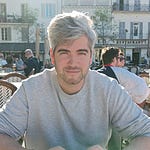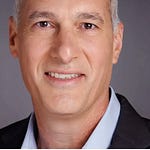The Green Techpreneur (GT) is here to #SparkTheTransition to a world where people, planet and profit align. We are a springboard platform for climate tech startups: we offer an investor/startup marketplace to help you raise funds and a magazine/podcast to share innovation and insight – by founders for founders. Join our network of over 5,200 climate tech entrepreneurs, investors, and sustainability warriors who are moving the needle on climate change.
You might think that working in waste-reduction, in a world that seems to be just keeping its head above the tidal wave of waste, would be a little thankless. But Todd Mathes, CEO of one of the US’ largest landfill-diversion firms, Denali, says he’s “more hopeful than fearful.” It’s a refreshing outlook – especially given the sector his company works with and food waste trends that show signs of a worsening wastage crisis.
Denali specialises in landfill-diversion and repurposing solutions. The company operates across the US to take waste streams that typically go to landfills – spoiled produce and food damaged in transit, food waste, dead plant matter and even expired condiments still in packaging and food-soiled wrappers – and converts these into useful products that go back into the food and agriculture sector. The solids are turned into green compost, animal feed, soil and much more. Liquid products, like residuals in water from cleaning or used cooking oil, can be repurposed into fertilisers or biodiesel. Many of their solutions go right back into the industries that produced them to reduce the input costs for food manufacturers and producers.
These circular solutions couldn’t be more urgently needed. Estimates suggest that the US wastes 38–40% of its food produced annually – that’s equivalent to 130 billion meals by some estimates, or over $400 billion worth of food, straight into landfills. That’s a huge financial waste, waste of space, and a great shame, given the amount of families living in food poverty in the US alone, some 17 million households in 2022 according to the US Department of Agriculture. The food waste epidemic is a global issue: the EU generates over 58 million tonnes of food waste each year according to the European Commission, while approximately 9.5 million tonnes of food waste are generated in the UK every single year. These facts should have us all hand-wringing as the cost of living crisis throws more families into food poverty.
Financial waste and poverty aside, it’s also pretty damming for the climate. Research shows that approximately 8% of global (human-induced) greenhouse gas emissions arise from food waste as its rotting.
So how can we produce affordable good food, stop the astronomical waste, and use earth’s land and water resources sustainably?
Todd has been in the food waste business for a long time and sees plenty of reasons for hope – Denali has been around since 2013, but he was also part of its predecessor, Terrarenewal, which was founded in the 1990s. In this time, he’s seen companies go from arbitrarily and superficially keeping score of waste, to actually starting to take meaningful action. He says there are a lot of young leaders in the space, and nowadays you “see large organisations embracing sustainability requirements and actually using sustainability as part of their decision-making process” – something that was probably unimaginable in the 90s.
The CEO says it’s “the excitement to work with the professionals I work with every day” that gets him out of bed in the morning. “It’s not hard to get up and work with the people I work with; I’m inspired by the excitement they have around our business.
He jumpstarts his day with a cup of coffee…”and I drink that watching Squawk Box on CNBC (US pre-morning news and talk show). The only other thing I do on a daily basis is take time out for myself to get in an afternoon workout every day.” It’s certainly refreshing to hear CEOs talking about time for themselves – oft undervalued in the business rat race.
“Every day I come to work with a plan…just about every day it gets derailed. But that keeps my work exciting,” says Todd. “We are part of an infrastructure that’s needed to keep the people who feed the world up and running – I think that’s really important and exciting. We want to make sure the world is fed and it’s done so in a sustainable way.”
What are some of Denali’s biggest achievements?
Denali recycled more than 2.6 billion pounds of food waste in under two years, working in partnership with over 10,500 grocers, including big names like Walmart and Kroger, as well as smaller food delivery services, like HelloFresh. We also partner with cities, hospitality providers and even the Super Bowl. The firm recycles more than 10 billion pounds of organic materials each year in addition to food (wastewater, sludge, plants, etc).
The fertiliser produced replaces a commercial fertiliser that would normally be derived from raw materials. Many of the dry goods, fruits and vegetables that Denali collects and processes are converted into very nutritious animal feed – that’s a really important part of the circular economy. The compost is bagged and sold back into retail outlets…We are a happy participant in how society is evolving and becoming more responsible.
What are Denali’s origins and how did you evolve?
This company grew from a small company called Terrarenewal and that company started addressing specific needs for processes where companies have to clean their water prior to discharging back to a municipality or into the environment and in doing so they would create this nutrient-rich slurry that we would take, test, and repurpose as a fertiliser for farmers. There were some very passionate entrepreneurs that started that business and that led into handling other organic waste streams.
What was pivotal to getting to where you are today?
There was tremendous vision from my predecessor. He had a big vision to compile different solutions to organic waste and bring them together as one network. He went out to find acquisition targets that fit that model for landfill diversion – he worked very hard to do that and it’s his vision that we’re continuing on today.
What are the main challenges your business faces?
We have a lot of competition from businesses offering similar services but not identical offers. So we have to compare ourselves to those solutions and convince customers that we have the better solution. This is an emerging market and there are lots of ideas out there, and lots of companies out there, but we are out there telling our story every day and we believe it makes a difference.
The acquisitions that we made to fit into our wider network - that comes with great change for those smaller entrepreneurs who were out there in local markets and that can be difficult. But once you see those entrepreneurs embrace the things we’re doing, it’s exciting to see the change and how they can evolve.
What trends do you see emerging in the food waste sector?
I see impetus at all levels primarily to reduce the waste. People are saying, let’s prevent waste food in the system and that’s good. So, over time we will continue to grow and develop solutions but I think we’ll [at Denali] have reduced raw material in our systems. But when you get into the mass-production of food, you’re not going to fully eliminate waste. There will always be byproducts and waste products in the system, and we’ll continue to use those.
We believe waste should not be wasted.
I also think re-use options will change with new technologies that are coming all the time – we’ve got our ear to the ground in that regard. Other trends include improvements in anaerobic digestion, increased fertiliser value, and new market products for organic waste. We’ve been doing this a long time but the space itself is starting to emerge into a new era.
How did you persuade over 10,500 major grocers – and many more partners besides – to buy into this particular circularity concept?
We did a good job of understanding their needs and what their goals were, so we could develop solutions that actually make sense not just from a sustainability perspective; they have to make sense financially too. If it’s too expensive, they won’t use the solution.
I can’t emphasise enough how important it is to provide good, value-adding service – always be at the service of your customer and provide robust feedback about what’s happening with their waste. It’s really all about good relationships. We’re getting better at it everyday, and the better we get, the better our relationship with our retail customers.
What are your top tips for other climate entrepreneurs?
Vision: Have a big vision for the future of your business. Don’t think small, think big. Be thinking, ‘I can do this today, but what can I create tomorrow?’
Persistence: you have to be persistent in pursuing that vision.
You have to serve your customers well, provide value back to them. I cannot emphasise enough the importance of offering your customers superior service and give them a true value proposition.
What’s your favourite quote?
My favourite quote is from Einstein “We cannot solve our problems with the same thinking we used when we created them.” I apply this by thinking, ‘how do I learn from yesterday to improve on tomorrow?’
My life philosophy is connected to this, I don’t like to look back, I like to be thinking ahead and forward. Learn and then move forwards. I call it ‘looking through the windshield, not the rearview.’
What have you learnt from role models?
When I was younger, it was definitely my grandfather. He was a farmer in Kansas and a very wise man, I learnt a lot from him.
My college coach – Ethan Reed – was very influential in my mindset. A lot of my collage teammates are also in leadership roles now, in their sectors, and I feel like his way of coaching led us to be leaders, to have a leadership mentality.
As I entered into business, one of my former managers said something that really stuck with me: “The best you can do is take the best you see in other people and deploy that in your life.” That one comment made me think about each person I interacted with on a daily basis, and if I like something, I adopt it. I can learn from somebody who’s brand new on the job, someone out there working hard driving a truck, just as easily as I can from someone who’s been in business for 40 years.
…………………………..…..If Todd could teleport himself 10 years into the future and be anywhere doing anything, he’d be mentoring and coaching in the industry: “I’ll probably have retired by then, but I’d still like to be involved as a mentor or coach, connected to the business and connected to other young professionals too.”
Thank you for reading and listening to The Green Techpreneur.
#SparkTheTransition,
Marianne


















Share this post